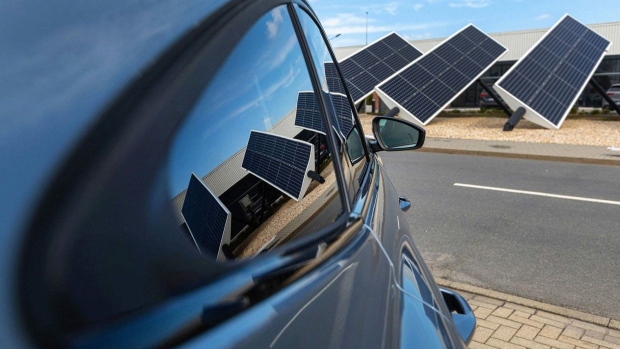Oct 18, 2022
Tipping Points Aren’t Just for Climate Catastrophes
, Bloomberg News

(Bloomberg) -- The personal carbon footprint has a dismal origin. It’s true — an oil company came up with it. An oil company also invented the lithium-ion battery. And now 1 in 10 new cars sold worldwide are electric, according to a recent finding from BloombergNEF.
How it started shouldn’t be confused with how it’s going. Climate change, after all, is the process of something as negligible as carbon-dioxide molecules accumulating bit by bit until the planet shakes. It’s easy to overlook that tipping points aren’t just for desertification, collapsing ice sheets and coral bleaching.
The same gradually-then-all-at-once dynamic also applies to decarbonizing technologies. Clean energy has a tipping point, and 87 countries have now crossed it. Green technologies that get plugged into the grid follow the same S-shaped curve. Electric cars take years to eke out gains in a market — but once ownership hits 5%, mass adoption goes into warp speed. The US just crossed that crucial threshold this year, among at least 18 other countries. Australia and Spain are expected to cross the line next.
There’s more weight to tip things over, thanks to increasingly generous incentives for everything from rooftop solar and e-bikes to furnace-replacing heat pumps. All these things fall within the realm of the personal. Even something as intangible as the fees on drivers in central London can become a force for EV adoption.
Your carbon footprint isn’t everything, but it is yours. It’s subject to direct action in a way that the collective politics of COP27 aren’t. It doesn’t get more collective than UN talks requiring consensus among all nations, and the summit to be held in Egypt will likely be defined by calls for climate reparations. The tipping point for arguing about “loss and damage,” as diplomats at COP27 call it, may prove to be Pakistan’s utterly devastating floods. An ugly impasse is brewing.
Government remains by far the biggest lever for eliminating emissions. But the personal is getting stronger, because there are more decarbonized options in people’s hands. Your dinner, your laundry, your playthings, your retirement account, your lawnmower — your power to shape our future has never been greater.
Welcome to the seventh issue of Bloomberg Green’s magazine.
Stories from the latest issue will continue rolling out through the end of October, with everything we’ve published available on this collection page. The only magazine focused on climate and the energy transition is sent to our all-access subscribers, so sign up today to receive a print edition along with full digital access to Bloomberg Green. This issue is all about decarbonizing everyday life. There’s also a special focus on climate solutions made in Africa and a guide to COP27 in Egypt, alongside the climate data and deep investigations at the center of every issue.
Below are some of the highlights so far…
- Tipping points aren’t just for climate catastrophes. Solar power, electric cars, grid-scale batteries, heat pumps — the world is crossing into a mass-adoption moment for green technologies.
- A Bitcoin mining boom is threatening to crush a shaky electrical grid in Texas. And the miners behind this surging demand for energy insist they’re helping the climate.
- The volatile weather of climate change is playing havoc on professional sports teams, and they’re turning to increasingly sophisticated forecasting tools.
- Quiet quitting on net zero? Some of the big banks that turned up at last year’s UN climate talks with new momentum on climate pledges are feeling anxious about what goes into cleaning up their holdings. Plus, read our complete coverage of COP27, including this deep examination of the politics of climate reparations after the flooding of Pakistan.
-
An old golf course can fight climate change. Just look at this example of transformation from fairway to wildlife habitat.
-
Suburban landlords are seeing green. The single-family rental industry is slowly making its homes more energy-efficient.
-
What keeps a champion surfer up at night? Kassia Meador is worried about the loss of all the kelp that she used to surf through.
©2022 Bloomberg L.P.





